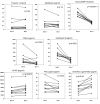Short term effects of milrinone on biomarkers of necrosis, apoptosis, and inflammation in patients with severe heart failure
- PMID: 19640280
- PMCID: PMC2724498
- DOI: 10.1186/1479-5876-7-67
Short term effects of milrinone on biomarkers of necrosis, apoptosis, and inflammation in patients with severe heart failure
Abstract
Introduction: Inotropes are associated with adverse outcomes in heart failure (HF), raising concern they may accelerate myocardial injury. Whether biomarkers of myocardial necrosis, inflammation and apoptosis change in response to acute milrinone administration is not well established.
Methods: Ten patients with severe HF and reduced cardiac output who were to receive milrinone were studied. Blood samples were taken just before initiation of milrinone and after 24 hours of infusion. Dosing was at the discretion of the patient's attending physician (range 0.25-0.5 mcg/kg/min). Plasma measurements of troponin, myoglobin, N-terminal-pro-BNP, interleukin-6, tumor necrosis factor-alpha, soluble Fas, and soluble Fas-ligand were performed at both time points.
Results: Troponin was elevated at baseline in all patients (mean 0.1259 +/- 0.17 ng/ml), but there was no significant change after 24 hours of milrinone (mean 0.1345 +/- 0.16 ng/ml, p = 0.44). There were significant improvements in interleukin-6, tumor necrosis factor-alpha, soluble Fas, and soluble Fas-ligand (all p < 0.05) indicative of reduced inflammatory and apoptotic signaling compared to baseline.
Conclusion: In conclusion, among patients with severe HF and low cardiac output, ongoing myocardial injury is common, and initiation of milrinone did not result in exacerbation of myocardial injury but instead was associated with salutary effects on other biomarkers.
Figures
References
-
- Cohn JN, Goldstein SO, Greenberg BH, Lorell BH, Bourge RC, Jaski BE, Gottlieb SO, McGrew F, 3rd, DeMets DL, White BG. A dose-dependent increase in mortality with vesnarinone among patients with severe heart failure. Vesnarinone Trial Investigators. N Engl J Med. 1998;339:1810–6. doi: 10.1056/NEJM199812173392503. - DOI - PubMed
-
- Cuffe MS, Califf RM, Adams KF, Jr, Benza R, Bourge R, Colucci WS, Massie BM, O'Connor CM, Pina I, Quigg R, Silver MA, Gheorghiade M. Short-term intravenous milrinone for acute exacerbation of chronic heart failure: a randomized controlled trial. Jama. 2002;287:1541–7. doi: 10.1001/jama.287.12.1541. - DOI - PubMed
-
- Levine B, Kalman J, Mayer L, Fillit HM, Packer M. Elevated circulating levels of tumor necrosis factor in severe chronic heart failure. N Engl J Med. 1990;323:236–41. - PubMed
-
- Tsutamoto T, Hisanaga T, Wada A, Maeda K, Ohnishi M, Fukai D, Mabuchi N, Sawaki M, Kinoshita M. Interleukin-6 spillover in the peripheral circulation increases with the severity of heart failure, and the high plasma level of interleukin-6 is an important prognostic predictor in patients with congestive heart failure. J Am Coll Cardiol. 1998;31:391–8. doi: 10.1016/S0735-1097(97)00494-4. - DOI - PubMed
Publication types
MeSH terms
Substances
Grants and funding
LinkOut - more resources
Full Text Sources
Other Literature Sources
Medical
Research Materials
Miscellaneous


